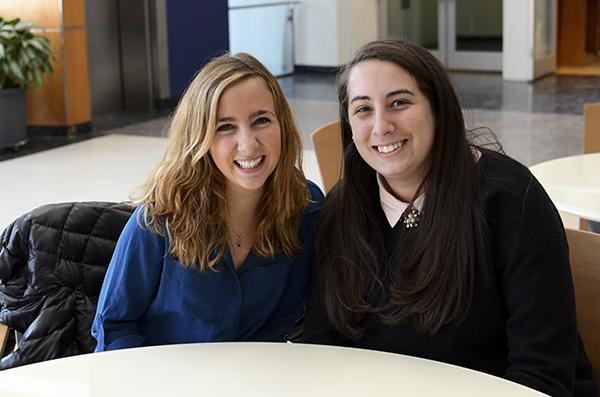Updated: April 20, 2015 at 2:31 p.m.
Graduating seniors who donate to GW this week will see their gifts double after an anonymous alumna agreed to match each donation up to $3,000.
The Senior Class Gift campaign’s two coordinators, seniors Michelle Ryngel and Alix Cohen, said they hope the week-long blitz starting Wednesday will incentivize more students to donate because each donation will have a greater impact. Experts say that organizing shorter programs to spur donations is an important way to draw in students and connect them philanthropically with their college at a younger age.
The coordinators said about 40 percent of seniors have already donated to the campaign. That rate of donating is about the same as last year’s at this time, and they said they expect to reach their goal of 60 percent of seniors making gifts by May. Each year, the campaign sets a higher participation goal, hoping to build a larger base of future alumni donors.
Cohen and Ryngel have planned senior nights at local bar Sign of the Whale and hosted events on campus since the fall. The week of donation matching will kick off with coffee in Kogan Plaza on Wednesday.
“We are continuing our planning, giving seniors a platform and place to be together, and have areas and events that they can stay together on campus once or twice a week until graduation week,” Cohen said.
Ryngel and Cohen declined to say how much has been raised so far or to which areas seniors are giving.
Board of Trustees Chair Nelson Carbonell, who has historically matched the class participation rate with a donation, will not be doing so this year. He and his wife have donated more than $156,000 to the University’s financial aid fund since 2010 through those Senior Class Gift campaign matching donations.
The amount raised through the campaign is just a sliver of the University’s overall fundraising efforts as officials look to reach a $1 billion fundraising goal over the next three years. But experts say getting students in the habit of giving is important to growing GW’s overall alumni donor base – a group that has historically been smaller compared to competitor schools.
Richard Ammons, a senior consultant at the fundraising consulting firm Marts & Lundy, said getting students in a habit of donating to their alma mater while they’re still undergraduates is key to ensuring donations continue down the line.
“Studies show that the earlier you build that habit, the longer and larger they will give to the university as they get older and have more discretionary spending,” Ammons said.
The campaign lets students donate to their school or groups such as Greek life, Alternative Breaks and student organizations, which Ammons said is an important way to draw in more donations.
“It is a way of connecting their desires with their philanthropy,” Ammons said. “If you think that scholarship and financial aid is important because you were a scholarship student, and you want to help students like yourself, you can donate. If you support the library because it was an important resource for you, this strategy is a way for you to support your passion with your philanthropy.”
Ryan Lasker contributed reporting.
This post was updated to reflect the following correction:
The Hatchet incorrectly reported that the anonymous donor was an alumnus. The donor is an alumna. The Hatchet also incorrectly reported that the week of donation matching would kick off with popsicles in Kogan Plaza on Wednesday. It will actually kick off with coffee. We regret these errors.







